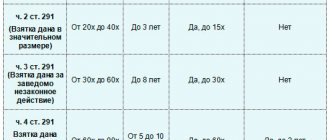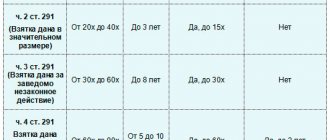One of the special crimes against justice is provocation of a bribe. Under the provocation of a bribe or commercial bribery, the criminal law means an attempt to transfer to an official or a person performing managerial functions in commercial organizations, without his consent, money, valuables, property or the provision of property-related services to him, for the purpose of artificially creating evidence of a crime or blackmail.
Article 304 of the Criminal Code of the Russian Federation contains only one simple composition, the disposition of which is indicated above. Provocation of a bribe is a crime of medium gravity and carries a maximum penalty of five years in prison.
From a legal point of view, the provocation of a bribe or commercial bribery should be understood as the deliberate creation by the provocateur of a situation that pushes or forces the victim to perform actions beneficial to the provocateur - to receive a bribe. The main goal of the provocateur is to create the appearance that an official or commercial employee has received a bribe, thus artificially creating evidence of the commission of crimes under Art. 290 of the Criminal Code of the Russian Federation Receiving a bribe, or Art. 204 of the Criminal Code of the Russian Federation Commercial bribery. The bribe can be left in the victim’s office, transferred to relatives, transferred to an account, the main condition for the formation of Art. 304 of the Criminal Code of the Russian Federation, this must be done without the knowledge and consent of the bribe-taker.
Since Art.
304 of the Criminal Code of the Russian Federation Provocation of a bribe is closely related to Art. 290 of the Criminal Code of the Russian Federation Receiving a bribe and Art. 204 of the Criminal Code of the Russian Federation Commercial bribery, at the initial stage after the very event of transferring (leaving) money or valuables, an ambiguous legal situation arises - which of the participants in the events committed the crime and who was the victim, what was committed, receiving a bribe, commercial bribery, or the bribe was provoked. If the bribe was made under operational support, then it will be possible to prove provocation and achieve termination of the case of receiving a bribe or commercial bribery only at the investigation stage, since operational measures are prepared in advance, the investigator receives already compiled material containing certain signs, and the timing of the procedural decision and the management They are often under pressure and give the command to initiate a case. CRIMINAL LAWYER call now: ☎ 8 (495) 532-75-40
If you face liability for provoking a bribe, protection under Art. 304 of the Criminal Code of the Russian Federation
The defense of provocation of a bribe can use the facts of extortion of money or valuables from the victims prior to the bribe, and demands for their transfer for certain actions. A bribery solicitation lawyer will study all the circumstances of the case and determine the best line of defense; everything, of course, depends on many circumstances. Charge under Art. 304 of the Criminal Code of the Russian Federation often stems from criminal cases against bribe takers, cases that were investigated for a long time and attempts to terminate and release the defendant from criminal liability for one reason or another failed. And there was only one option left - since there was no bribe, it means there was a provocation. In this case, his recent faithful servants fall under the millstone of justice and are sacrificed. Usually this process is not so fleeting, and if there are any prerequisites that the situation may turn out this way, we recommend that you get a reliable lawyer in advance and begin to take active steps. Call a lawyer in advance, provide yourself with protection in advance so that it is not too late.
Commentary on Article 304 of the Criminal Code of the Russian Federation
1. The victim is an official or a person performing managerial functions in commercial or other organizations, the concepts of which are contained respectively in the notes to Art. Art. 285 and 201 of the Criminal Code.
2. The objective side of the crime is expressed in the provocation of a bribe or commercial bribery, i.e. in an attempt to transfer to an official or a person performing managerial functions in commercial or other organizations, without his consent, money, securities, other property or to provide him with services of a property nature for the purpose of artificially creating evidence or blackmail.
The concepts of bribe and commercial bribery are enshrined by the legislator, respectively, in Art. Art. 290 and 204 of the Criminal Code.
The essence of provocation is revealed in the law itself and consists of an attempt to transfer a bribe without the consent of the person to whom it is intended (the victim himself, his relatives or friends, colleagues for subsequent transfer to the recipient, etc.). Lack of consent means that the official or person performing managerial functions did not openly or covertly demand the transfer of a bribe or commercial bribery and did not express a willingness to accept illegal remuneration.
3. The crime is considered completed from the moment the actions specified in the law are committed.
4. The subjective side of the crime is characterized by direct intent. The law specifies the purpose as a mandatory feature: artificial creation of evidence of a crime or blackmail.
5. The subject of the crime is a person who has reached the age of 16 years.
Article 304. Protection of the owner’s rights from violations not related to deprivation of possession
Decision of the Supreme Court of the Russian Federation dated October 25, 2018 in case N AKPI18-880 In accordance with Article 304 of the Civil Code of the Russian Federation, the owner may demand the elimination of any violations of his rights, even if these violations were not associated with deprivation of possession. Clause 3.1 of Part 2 of Article 44 of the Housing Code of the Russian Federation establishes that making decisions on identifying persons who, on behalf of the owners of premises in an apartment building, are authorized to conclude agreements on the use of the common property of the owners of premises in an apartment building falls within the competence of the general meeting of owners of premises in an apartment building. home.
Determination of the Judicial Collegium for Civil Cases of the Supreme Court of the Russian Federation dated February 19, 2019 N 49-КГ18-63
By virtue of Art. 304 of the Civil Code of the Russian Federation, the owner may demand the elimination of any violations of his rights, even if these violations were not associated with deprivation of possession. As explained in paragraph 45 of the resolution of the Plenum of the Supreme Court of the Russian Federation No. 10, the Plenum of the Supreme Arbitration Court of the Russian Federation No. 22 of April 29, 2010 “On some issues arising in judicial practice when resolving disputes related to the protection of property rights and other property rights rights”, applying Art. 304 of the Civil Code of the Russian Federation, by virtue of which the owner may demand the elimination of any violations of his rights, even if these violations were not associated with deprivation of possession, the courts must take into account the following.
Determination of the Constitutional Court of the Russian Federation dated February 28, 2019 N 329-O
Articles 301 and 304 of the Civil Code of the Russian Federation in their interrelation - since, according to the meaning given to them by law enforcement practice, they allow, on the basis of claims of public legal entities for recognition of the ownership right as absent, the confiscation from citizens of land plots, the ownership right to which they believe has arisen applicant, legally; allow the seizure of land plots on which water bodies are located without the use of protection methods specially designed for such cases; allow the satisfaction of a negative claim brought against a person who actually owns a land plot, which contradicts both the literal meaning of the law and its interpretation given by the highest judicial authorities; and also lead to a disproportionate restriction of the rights of the owner of the land plot, who is also its actual owner, due to the impossibility of separating the part of the land plot on which the water body is located;
Determination of the Constitutional Court of the Russian Federation dated February 28, 2019 N 330-O
Articles 301 and 304 of the Civil Code of the Russian Federation in their interrelation - since, according to the meaning given to them by law enforcement practice, they allow, on the basis of claims of public legal entities for recognition of the ownership right as absent, the confiscation from citizens of land plots, the ownership right to which they believe has arisen applicant, legally; allow the seizure of land plots on which water bodies are located without the use of protection methods specially designed for such cases; allow the satisfaction of a negative claim brought against a person who actually owns a land plot, which contradicts both the literal meaning of the law and its interpretation given by the highest judicial authorities; and also lead to a disproportionate restriction of the rights of the owner of the land plot, who is also its actual owner, due to the impossibility of separating the part of the land plot on which the water body is located;
Ruling of the Supreme Court of the Russian Federation dated March 27, 2019 N 304-ES19-2437 in case N A46-24171/2017
Resolving the stated claims, the appellate court, whose conclusions were supported by the district court, guided by Articles 304, 305 of the Civil Code of the Russian Federation, the explanations given in paragraph 45 of the resolution of the Plenum of the Supreme Court of the Russian Federation and the Plenum of the Supreme Arbitration Court of the Russian Federation dated April 29, 2010 N /22 “On some issues arising in judicial practice when resolving disputes related to the protection of property rights and other property rights”, paragraphs 5, 13 of Article 3, paragraph 2 of Article 20, part 6 of Article 22, subparagraph 4 of paragraph 2 of Article 29 Federal Law dated 08.11.2007 N 257-FZ “On highways and road activities in the Russian Federation and on amendments to certain legislative acts of the Russian Federation”, paragraphs 1.3, 1.4, 2.16, 2.17 VSN 103-74 “Departmental construction standards” “Technical instructions” for the design of intersections and junctions of highways”, approved by the Ministry of Transport Construction of the USSR on September 23, 1974, clause 5.5.11 of GOST R 52766-2007 “National Standard of the Russian Federation” “Public automobile roads. Elements of arrangements. General requirements", approved by order of the Federal Agency for Technical Regulation and Metrology dated October 23, 2007 N 270-st, establishing the absence of a properly equipped junction of the highway with a gas station owned by the company, taking into account that the highway does not meet the traffic safety requirements funds, creates a threat to the life and health of road users, came to the conclusion that there are grounds to satisfy the stated requirements.
Ruling of the Supreme Court of the Russian Federation dated 04/08/2019 N 308-ES18-25496 in case N A32-12361/2017
Meanwhile, the legal position of the Presidium of the Supreme Arbitration Court of the Russian Federation in the said resolution was formed in a case in which the plaintiff, the owner of a real estate property, in order to protect his right to privatize the land plot under his real estate property, filed a lawsuit to declare the transaction for the sale of a land plot invalid, therefore The court, on the basis of Articles 208 and 304 of the Civil Code of the Russian Federation, qualified the requirement to invalidate the transaction for the alienation of the land plot under this building as not related to deprivation of possession and not subject to the limitation period.
Determination of the Constitutional Court of the Russian Federation dated March 26, 2019 N 704-O
ARTICLE 304 OF THE CIVIL CODE OF THE RUSSIAN FEDERATION The Constitutional Court of the Russian Federation, composed of Chairman V.D. Zorkin, judges K.V. Aranovsky, A.I. Boytsova, N.S. Bondar, G.A. Gadzhieva, Yu.M. Danilova, S.M. Kazantseva, S.D. Knyazeva, A.N. Kokotova, L.O. Krasavchikova, S.P. Mavrina, N.V. Melnikova, Yu.D. Rudkina, O.S. Khokhryakova, V.G. Yaroslavtseva,
Ruling of the Supreme Court of the Russian Federation dated April 12, 2019 N 304-ES19-3782 in case N A45-2917/2018
Having examined and assessed in totality and mutual connection the evidence presented in the case according to the rules of Chapter 7 of the Arbitration Procedure Code of the Russian Federation, guided by the provisions of Articles 233, 246, 304, Civil Code of the Russian Federation, paragraph 4 of part 1 of Article 36 of the Housing Code of the Russian Federation, the explanations set out in paragraph 45 resolution of the Plenum of the Supreme Court of the Russian Federation and the Plenum of the Supreme Arbitration Court of the Russian Federation dated April 29, 2010 N /22 “On some issues arising in judicial practice when resolving disputes related to the protection of property rights and other property rights”, establishing the absence of evidence indicating the presence of obstacles in the entrepreneur’s use of his non-residential premises and land, and also taking into account that this claim affects the legal rights of other owners - members of the Zaeltsovskaya 2 HOA, the court of first instance rejected the claim.
Ruling of the Supreme Court of the Russian Federation dated April 12, 2019 N 305-ES19-3939 in case N A40-82787/2017
Adopting the appealed judicial acts, the courts of the first and appellate instances, guided by the provisions of Articles , , 304, 309, 310 of the Civil Code of the Russian Federation, came to the conclusion that the fact of violation by the defendant of the rights of the plaintiff, on which the claim is based, is confirmed by the materials presented in the case evidence, including correspondence between the plaintiff and FKU "UKS EMERCOM of Russia" on the issue of construction of a storm sewer on the territory of GSK No. 2 "Zhiguli", photographic materials showing the plaintiff's flood area, its extent and the process of relaying the storm sewer, as well as other documents , including a letter from the Minister of Emergency Situations of Russia addressed to the deputy of the State Duma of the Federal Assembly of the Russian Federation, Colonel General V.M. Zavarzin, statements addressed to the chairman of GSK No. 2 "Zhiguli" of the owners of garage boxes of GSK No. 2 "Zhiguli", which suffered material damage as a result of flooding.
Determination of the Judicial Collegium for Civil Cases of the Supreme Court of the Russian Federation dated April 2, 2019 N 4-КГ19-2
Guided by the provisions of Article 304 of the Civil Code of the Russian Federation on the right of the owner to demand elimination of violations of his right, as well as Articles 15 and 1064 of the said code governing tort relations, the appellate court referred to the fact that the defendants LLC and Sistema LLC harmed the plaintiff as the owner there was no damage to the building, and therefore the claim was filed without basis.
Determination of the Constitutional Court of the Russian Federation dated May 29, 2019 N 1307-O
Thus, Article 304 of the Civil Code of the Russian Federation also cannot be considered as violating the constitutional rights of the applicant’s minor son in the aspect indicated in the complaint. The establishment and investigation of the factual circumstances of a particular case, including determining whether the disputed non-residential premises belong to the common property in an apartment building, are not within the competence of the Constitutional Court of the Russian Federation, as enshrined in Article 125 of the Constitution of the Russian Federation and Article 3 of the Federal Constitutional Law " On the Constitutional Court of the Russian Federation."






